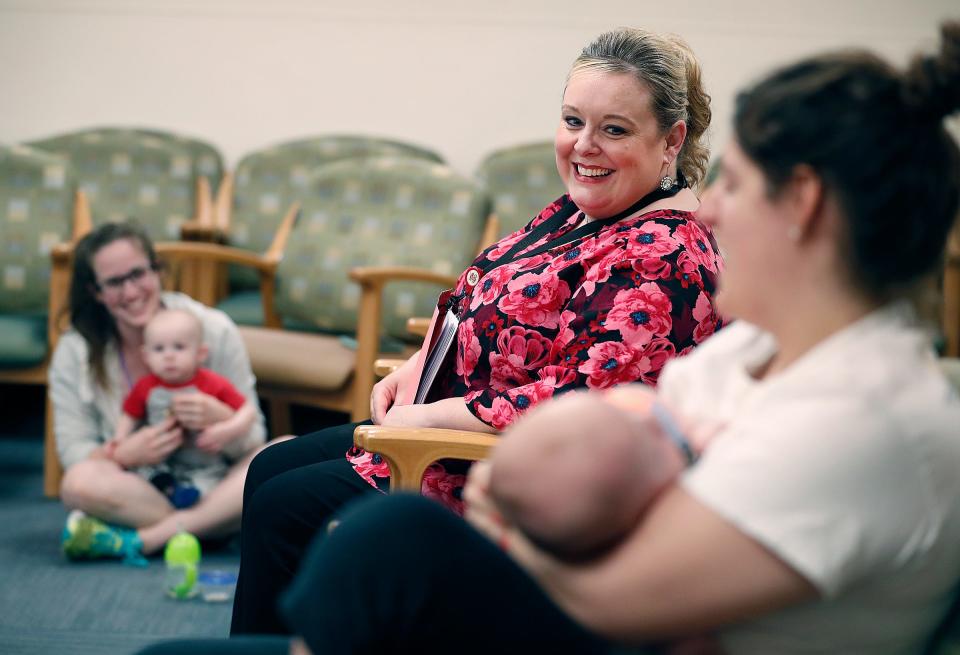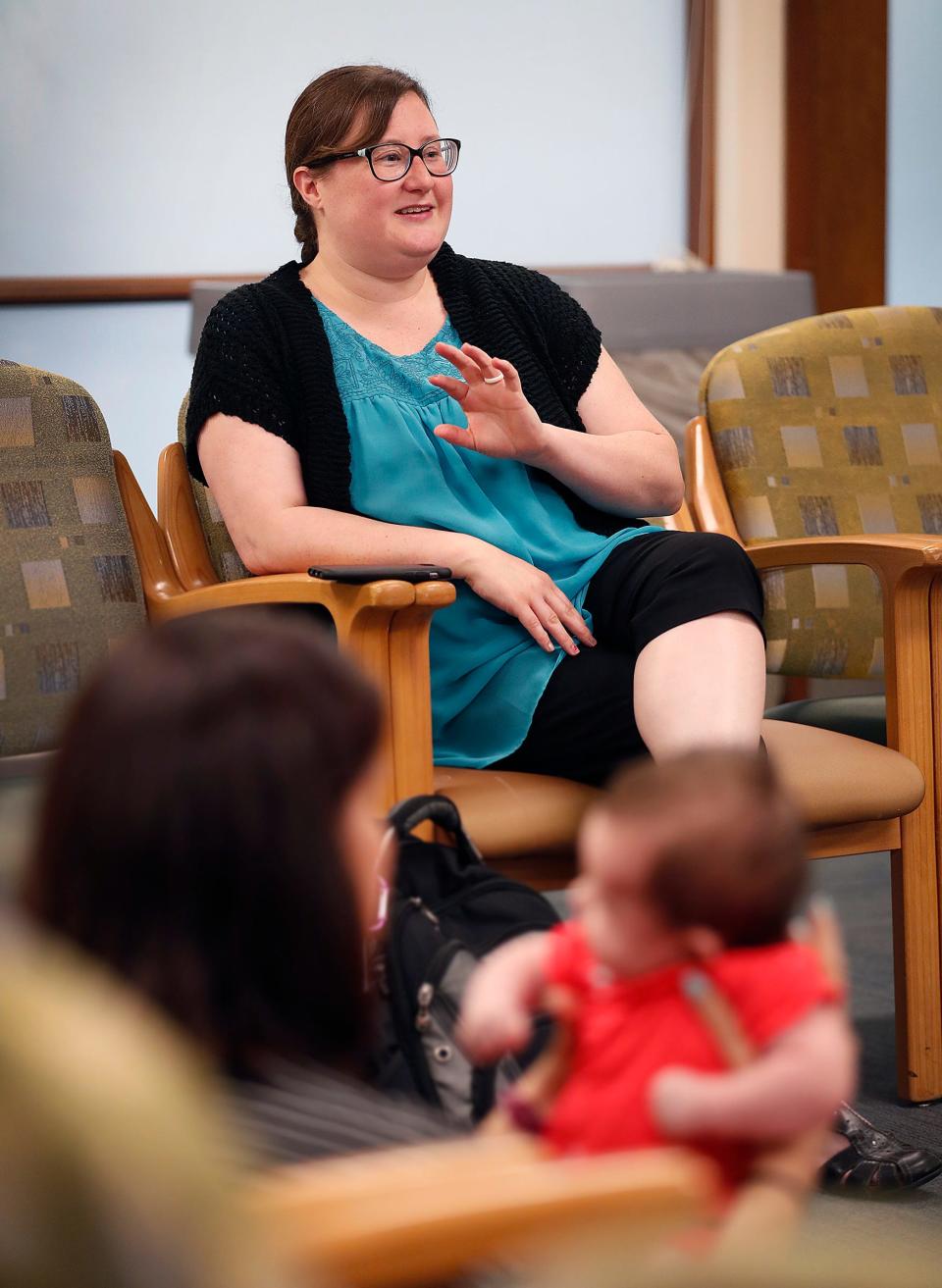Moms welcome 'faster relief' of new postpartum depression drug, but access and $34K may hold them back
The first drug specifically designed to treat postpartum depression has been approved, promising relief to millions of women who experience the mental health disorder after giving birth.
But women won’t be rushing out to fill prescriptions at their local drugstores.
The drug Zulresso carries a whopping $34,000 price tag. What's more, it must be administered in a hospital, hospitals must be certified to do so with the general public, and it's unclear how many hospitals will offer the treatment.
Tracey McInnes wants Indiana University Health, where she's a therapist specializing in perinatal mood disorders, to offer it. And she also knows all too well how serious postpartum depression can be.
'Afraid to be alone with my child'
Before her pregnancy, she wanted to be a mom more than anything else in the world. Her pregnancy was textbook perfect, and she had no history of mental health issues.
But when her son was born in 2003, anxiety gripped her, robbing her of sleep. Frustration added to the mix when she was unable to breast feed.
"I was absolutely afraid to be alone with my child. I was terrified because I didn’t feel capable of caring for him,” she said. “No one asked how I was feeling, but I remember being afraid that someone might because I was so emotional that I wouldn’t know how to get through that conversation.”

Doctors initially prescribed a medicine that made her feel worse and she now realizes her condition could have developed into psychosis had she not taken medicine to help her sleep.
When she had her daughter three years later, she was no longer on medication, and the symptoms crept back.
Now, she’s eager to offer Zulresso to women in pain. And some health systems are exploring the option.
“Had there been a cure with something that would have cured me then, that would have made my life easier,” she said.
How Zulresso works
The drug, Zulresso, is akin to allopregnanolone, a neurosteroid derived from the hormone progesterone. Childbirth can cause progesterone levels to plunge, which in turn can lead to a dramatic decrease in allopregnanolone. Researchers believe that the drop may trigger postpartum depression or its associated disorders.
But taking Zulresso, which is made by Sage Therapeutics, requires more than simply swallowing a pill once or twice a day. Instead, the drug is delivered through an IV over the course of two and a half days. Because side effects include extreme sleepiness and dizziness, as well as headaches, patients must be hospitalized during the infusion and monitored to make sure they are not too sedated.
In order to offer Zulresso once it’s on the market, hospitals will have to be certified by the Food and Drug Administration’s Risk Evaluation and Mitigation Strategies program, said Alexis Smith, a Sage spokesperson in an email.
A successful trial, but still skepticism
Franciscan Health Indianapolis recently treated its first woman with the drug under a study protocol, said Melanie Boosey, manager of the hospital’s labor and delivery and antepartum unit.
The patient had tried antidepressants and counseling but a few months after birth showed little improvement. Her obstetrician contacted the company and worked with Sage to give the woman the drug, Boosey said.
The doctor also had to have buy-in from the hospital, since the patient would require one-on-one nursing care round the clock. Sage trained staff via a webinar on what to watch for during the time the patient was in the hospital.
Because the woman was receiving the drug as part of a research study, the company gave it to her free and the hospital covered the cost of care, Boosey said.
All went well and Boosey said she thought it likely that the hospital would see more patients in the future.
“I would say that several women a year might benefit,” she said. “If it’s the right patient, we would be willing to do that…. I would hope that we would be able to provide something in the future.”
Indiana health network IU Health’s McInnes also hopes that her hospital adds Zulresso infusion to its services. And officials at the hospital are considering how to move forward to do just that, IU Health spokeswoman Emily Garrett said.
Not every hospital, however, is rushing to offer it. Another Indiana health network Community Health Network spokeswoman Kris Kirschner said in an email that that health system had “thoughtfully considered it but have decided not to utilize this drug at this time.”
Postpartum depression signs and symptoms
The most common complication of childbirth, postpartum depression affects about one in nine women, according to Sage Therapeutics estimates. Only about half of those women are diagnosed and treated, however. Other estimates suggest that perinatal mood and anxiety disorders are even more common, with one in five women affected at some point.
Personal or family history of depression or anxiety, bipolar disorder, schizophrenia or a history of perinatal mood disorder may predispose women to developing the condition, McInnes said.
Other risk factors include a complicated or difficult pregnancy, a history of abortions or miscarriages, and many major stressors such as the recent death of a loved one, move or job change. In some cases, living far from, or losing, one's mother can be a trigger, she said.
In her current role, McInnes conducts assessments of mothers who may have a perinatal mood disorder. McInnes poses a series of 10 questions to gauge a new mother’s emotional state. Has she had thoughts of suicide or harming herself? Been more worried than usual? What is her overall mood?
If she feels a woman needs help, McInnes may recommend that her doctor put her on medication. She also invites them to attend a weekly support group. About seven to 10 women come each week.
Often, she finds women resistant to taking medicine to treat their condition.
“It’s just the stigma of mental health,” she said. “They will treat their gestational diabetes with insulin without a second thought, but when we tell them they have to treat their postpartum depression or anxiety, it’s like 'oooh I’m not taking anything of that sort.'”
Similarly, having to take Zulresso intravenously may lead many women to pause. Sage is investigating an oral compound similar to Zulresso that has shown positive results in studies, Smith said.
Still, for someone who has been through postpartum depression the drug could offer a much-desired cure.
'Scary and rotten feelings'
After the birth of her first two babies, Ashlee Sherwood experienced no problems whatsoever. But two weeks after the birth of her third child, a healthy little girl, Sherwood, who considers herself a resilient person, found herself often in tears and unusually anxious.

The intensity and duration of the Avon mother's depression was no typical baby blues. When her husband expressed concern as well, she called her doctor.
Her obstetrician referred her to McInnes.
Sherwood joined McInnes’s weekly support group and started on medicine to treat her depression and anxiety. While both brought relief, it took time.
“It would definitely be nice to have something that would provide relief faster because these are some pretty scary and rotten feelings,” Sherwood said. “Everything was wonderful with my world and it (postpartum depression) still happened to me…. It can definitely hit anybody and if it does, I would definitely encourage them to reach out as soon as possible to get help.”
Contact IndyStar reporter Shari Rudavsky at 317-444-6354 or shari.rudavsky@indystar.com. Follow her on Facebook and on Twitter: @srudavsky.
Like All the Moms?
Connect with us on Facebook.
READ MORE
'I had really changed:' Chrissy Teigen talks postpartum depression and hints at more babies
Don't jump for joy over new FDA-approved postpartum depression medicine yet
This article originally appeared on Indianapolis Star: Moms welcome 'faster relief' of new postpartum depression drug, but access and $34K may hold them back

